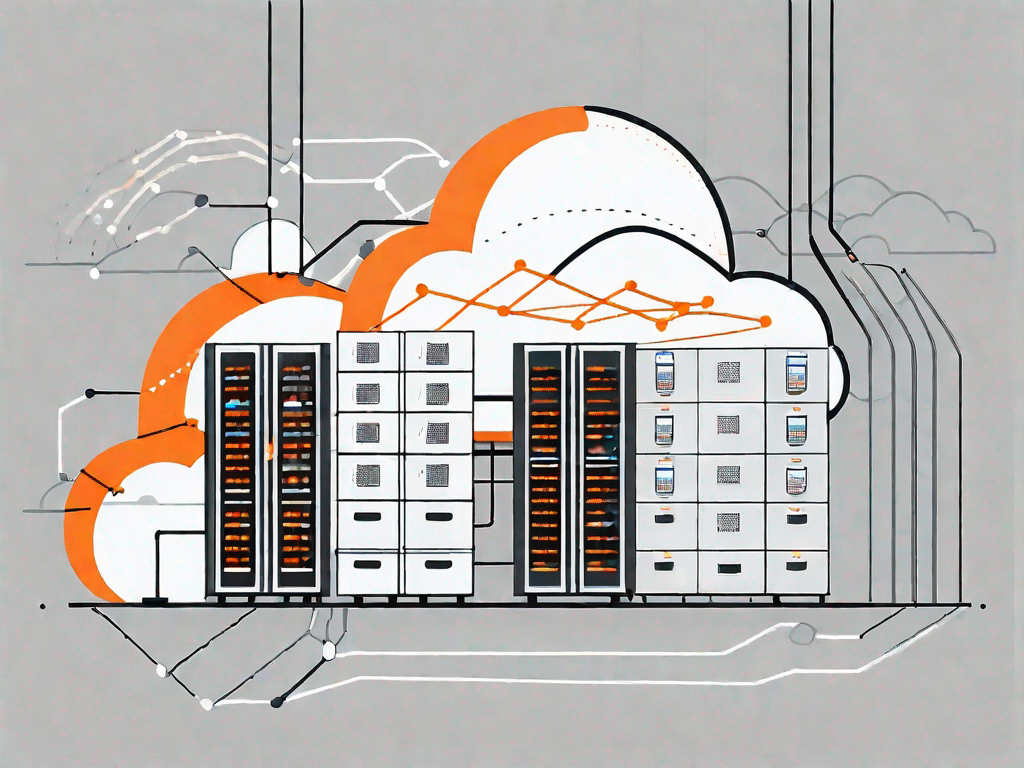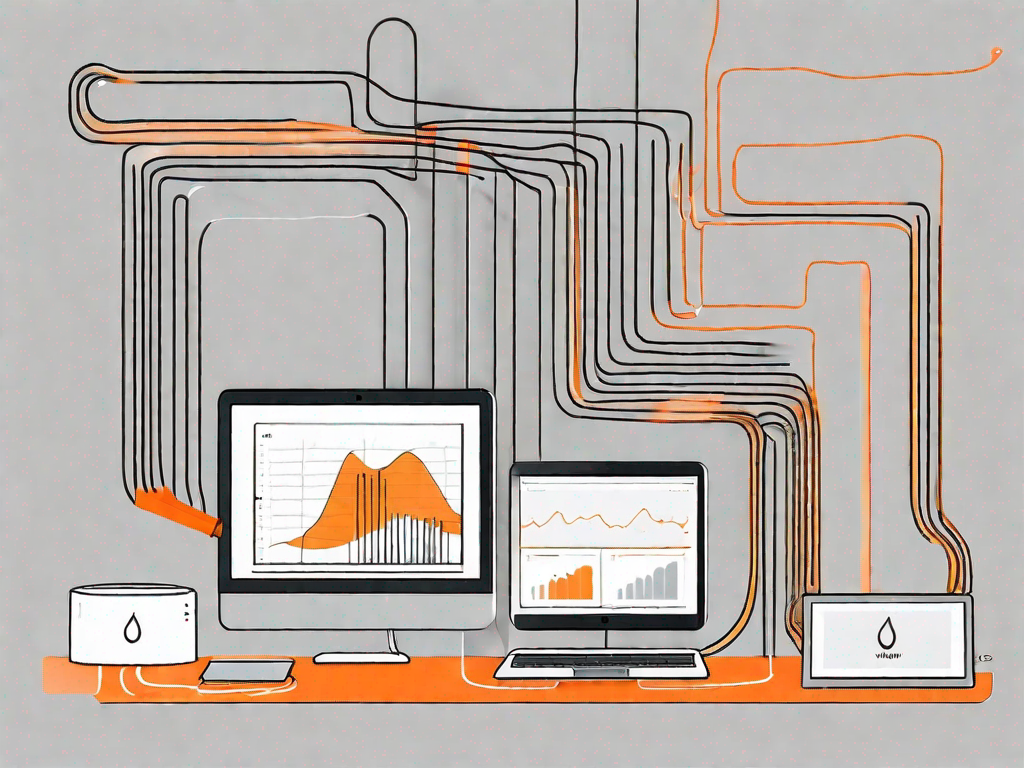.svg)
The Role of Web Hosting in Analytics and Data Collection
.svg)

Web hosting plays a crucial role in analytics and data collection. In today's digital landscape, businesses and organizations heavily rely on collecting and analyzing data to gain valuable insights into their customers, market trends, and overall performance. This article explores the fundamental importance of web hosting in these processes and how it can influence data analytics and collection.
Understanding Web Hosting and Its Importance
Before delving into the connection between web hosting and analytics, it is essential to first define what web hosting is and why it is integral to an online presence.
Web hosting refers to the service that allows individuals and businesses to make their websites accessible on the internet. It involves storing website files, data, and content on servers that are maintained and managed by hosting providers.
But let's take a step back and explore the fascinating history of web hosting. The concept of hosting websites on servers dates back to the early days of the internet. In the 1990s, as the World Wide Web gained popularity, individuals and businesses started to realize the potential of having an online presence. However, hosting a website was not as straightforward as it is today.
In those early days, individuals and businesses had to set up their own servers, which required technical expertise and significant financial investment. It was a complex and time-consuming process that only a few could afford. But then came the emergence of web hosting providers, offering a solution that revolutionized the way websites were hosted.
Today, web hosting has become an essential part of the online landscape. Whether you are a small business owner, a blogger, or an e-commerce giant, having reliable web hosting is crucial for maintaining a professional online presence. It ensures that websites are consistently accessible to users, providing a seamless user experience and maximizing the reach of a business or organization.
But what exactly makes web hosting so important? Let's delve deeper into its integral role in an online presence.
One of the key aspects of web hosting is ensuring that websites are available to users 24/7. Imagine visiting a website only to find it inaccessible or experiencing slow loading times. It can be frustrating and may lead users to abandon the site altogether. With reliable web hosting, websites are hosted on servers that are optimized for performance, ensuring that users can access them quickly and efficiently.
Another crucial aspect of web hosting is data security. In today's digital age, data breaches and cyber attacks are a constant threat. Hosting providers invest heavily in security measures to protect websites from unauthorized access, malware, and other potential risks. They employ firewalls, encryption, regular backups, and other security protocols to safeguard the data and sensitive information stored on their servers.
Furthermore, web hosting allows businesses and individuals to scale their online presence as their needs grow. Whether it's increasing website traffic, expanding product offerings, or accommodating more users, hosting providers offer flexible plans that can be upgraded to meet the evolving demands of a website. This scalability ensures that websites can handle increased traffic and provide a seamless user experience even during peak periods.
Additionally, web hosting providers often offer additional features and tools that enhance the functionality and performance of websites. These can include content management systems (CMS), e-commerce platforms, email hosting, and website builders. These features enable businesses to create and manage their online presence effectively, without the need for extensive technical knowledge.
In conclusion, web hosting is a vital component of an online presence. It allows individuals and businesses to make their websites accessible on the internet, ensuring a seamless user experience, data security, scalability, and additional features. So, whether you are starting a new website or looking to improve your existing online presence, choosing a reliable web hosting provider is a decision that should not be taken lightly.
The Connection between Web Hosting and Analytics
While web hosting is primarily focused on website availability, its impact extends to data analytics as well.
Web hosting plays a crucial role in the world of data analytics. It directly affects the performance and availability of a website, which in turn impacts the collection and analysis of data. A slow or unreliable website can hinder the data analytics process, as users may be deterred from engaging with the site or experience difficulties accessing it.
Imagine a scenario where a website takes ages to load or frequently crashes due to poor web hosting. In such cases, users are likely to abandon the site out of frustration, resulting in incomplete data collection. This incomplete data can lead to skewed analysis and unreliable insights.
On the other hand, reliable web hosting ensures that a website is always accessible and responsive. This creates a seamless user experience, encouraging visitors to explore the site further and engage with its content. As a result, the data collected from these interactions becomes more comprehensive and accurate, providing valuable insights for data analytics.
How Web Hosting Influences Data Analytics
Web hosting not only impacts the availability and performance of a website but also influences the data analytics process in several ways.
One significant aspect is website loading speed. The speed at which a website loads plays a critical role in user experience and search engine rankings. With efficient web hosting, a website can load quickly, ensuring that users can access the desired content without any delays. This improved loading speed not only enhances user satisfaction but also encourages longer visits to the site.
Think about it - when was the last time you stayed on a website that took forever to load? Chances are, you quickly moved on to another site that provided a faster and smoother experience. By investing in reliable web hosting, businesses can ensure that their website loads swiftly, keeping users engaged and increasing the chances of collecting more comprehensive data for analysis purposes.
Another way web hosting influences data analytics is through website availability. If a website frequently experiences downtime due to poor hosting, it not only frustrates users but also disrupts the data collection process. Imagine trying to analyze user behavior when the website is constantly inaccessible. It becomes nearly impossible to gather accurate and reliable data under such circumstances.
However, with reliable web hosting, businesses can ensure that their website remains available and accessible to users at all times. This uninterrupted availability allows for continuous data collection, enabling businesses to analyze user behavior and make informed decisions based on reliable insights.
The Impact of Web Hosting on Traffic Analysis
Understanding website traffic is vital for businesses and organizations looking to optimize their online presence. Web hosting plays a significant role in traffic analysis by providing the necessary infrastructure to collect and process data on website visits, page views, referral sources, and more.
Imagine a scenario where a website lacks the necessary hosting infrastructure to track and measure traffic accurately. In such cases, businesses would be left in the dark, unable to gain insights into user behavior and preferences. This lack of information can hinder their ability to make data-driven decisions and improve their online strategies.
However, with reliable web hosting, businesses can accurately track and measure website traffic. By leveraging the hosting infrastructure, businesses can gather valuable data on the number of visitors, their geographical locations, the pages they visit, and even the sources that referred them to the website.
With this data in hand, businesses can gain a deeper understanding of their target audience, identify trends, and make informed decisions to optimize their online presence. Whether it's identifying popular content, improving user experience, or targeting specific demographics, reliable web hosting ensures that businesses have access to accurate and comprehensive data for effective traffic analysis.
Web Hosting and Data Collection: A Crucial Relationship
Web hosting goes beyond website availability and directly contributes to data gathering and integrity.
The Role of Web Hosting in Data Gathering
Web hosting provides the infrastructure for collecting various types of data, including user information, interactions, transactions, and preferences. It ensures that data is captured accurately and securely, enabling businesses to develop valuable insights into their target audience.
Additionally, web hosting allows for the integration of data collection tools such as analytics platforms, customer relationship management (CRM) systems, and email marketing software. These tools further enhance data gathering capabilities and enable businesses to create more personalized experiences for their customers.
Ensuring Data Integrity through Reliable Web Hosting
Data integrity is crucial for accurate analysis and decision-making. Reliable web hosting ensures the secure storage and transmission of data, reducing the risk of data breaches, corruption, or loss.
By selecting a reputable hosting provider that prioritizes data security, businesses can maintain the integrity of their collected data and comply with data protection regulations.
Choosing the Right Web Hosting for Optimal Data Analysis
Selecting the right web hosting service is vital to ensure optimal data analysis capabilities.
Factors to Consider in Selecting a Web Hosting Service
When choosing a web hosting service, several factors need to be considered. These include reliability, scalability, security, data backup options, and support availability. Careful evaluation and consideration of these factors will result in a hosting solution that meets the specific requirements of data analysis and collection.
The Role of Web Hosting in Enhancing Data Collection Efficiency
Efficient data collection is vital for timely analysis and decision-making. A well-optimized web hosting service can enhance data collection efficiency through server speed, data storage capacities, and the ability to handle high volumes of traffic.
Advanced web hosting technologies such as content delivery networks (CDNs) and caching mechanisms can significantly improve the speed and efficiency of data collection processes, providing businesses with real-time insights into their operations.
The Future of Web Hosting in the Realm of Analytics and Data Collection
As technology continues to advance, web hosting is expected to play an even more significant role in analytics and data collection.
Emerging Trends in Web Hosting and Data Analytics
Advancements in web hosting technologies such as cloud hosting, edge computing, and artificial intelligence (AI) are revolutionizing the field of data analytics. These technologies offer enhanced scalability, faster processing speeds, and improved insights, further empowering businesses to make data-driven decisions.
How Advancements in Web Hosting Could Revolutionize Data Collection
The integration of advanced technologies into web hosting services will revolutionize data collection by enabling real-time data streaming, intelligent data processing, and predictive analytics capabilities. This will provide businesses with more accurate and actionable insights, ultimately driving innovation and growth.
In conclusion, web hosting plays a vital role in analytics and data collection. From ensuring website availability to influencing data analytics and gathering, web hosting is an integral part of any organization's online presence. Selecting the right web hosting service is crucial for optimal data analysis, and as technology advances, web hosting will continue to shape the future of analytics and data collection.
Let's
Let’s discuss how we can bring reinvigorated value and purpose to your brand.







.svg)